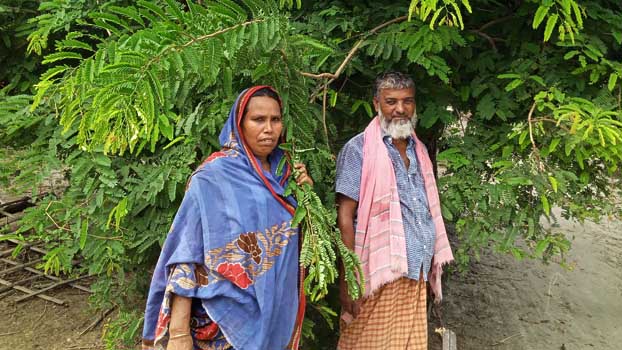Jhenaidah farmers reap benefit from tamarind transplantation


Initiatives of transplantation of tamarind saplings has been benefiting the farmers in remote villages and ensuring nutrition for the people, especially, children in Jhenaidah.
The farmers have been taking intensive care of the plants at their homesteads. Most of the plants have started offering fruits within three years of transplanting, said the villagers.
This correspondent visited Gosaidanga village of Sarutia union in Shailkupa upazila of Jheniadah, locally known as Tetulgram (tamarind village) recently and talked to the villagers. They said the field officer of local Agriculture Extension Department had arranged training for some farmers of the village about four years back. His office provided tamarind saplings for the listed villagers too.
Each and every farmer transplanted the saplings at their homesteads on the roadside. Within three years some of the plants started offering fruits. About 40 per cent of the plants offered fruits in the current season. The remaining ones are expected to offer fruits in the next year, they said.
Farmer Abul Kalam and his wife Shahinur Khatun talking to this correspondent at their tamarind plot said they have been receiving some fruits from the trees since last season and they are expecting 100 per cent fruits in the next season. The couple said the locals, especially, the children have been taking away the fruits since the immature stage due to its great demand.
Renowned child specialist, former principal of Magura Medical College Professor Dr. Aloke Kumar Saha when contacted said tamarind contains several vitamins including vitamin C as well as manganese, zinc, copper etc. It helps remove iron deficiency, cholesterol, fat, risk of stroke, heart diseases, diabetes, arthritis, indigestions, kidney troubles and some other medical problems.
The anti-inflammatory objects of tamarind are most effective in controlling any inflammation in the human body. Further, it is widely fond to the women community round the globe. Tamarind pickle (chatni) is also a lucrative item to the children of all ages. If someone consumes tamarind daily, he or she might lead a healthy life without any drug, Professor Saha added.
A source of Jhenaidah DAE informed that they have set up separate villages for some local and decaying variety of fruits and vegetables in all six upazilas.
Jhenaidah farmers had produced 96 tons of tamarind on 12 hectares of land in Jhenidah Sadar, 121 tons on 10 hectares in Kaliganj, seven tons on one hectare in Kotchandpur, 20 tons on two hectares in Moheshpur, 40 tons on nine hectares in Shailkupa and 44 tons on two hectares of land in Harinakundu upazila this season.
Upazila agriculture officer in Shailkupa Akram Hossain when contacted said they had advised the field level DAE officials to monitor the caring of the tamarind plants so that the farmers could reap better fruits and ensure nutrition for people of all ages.



